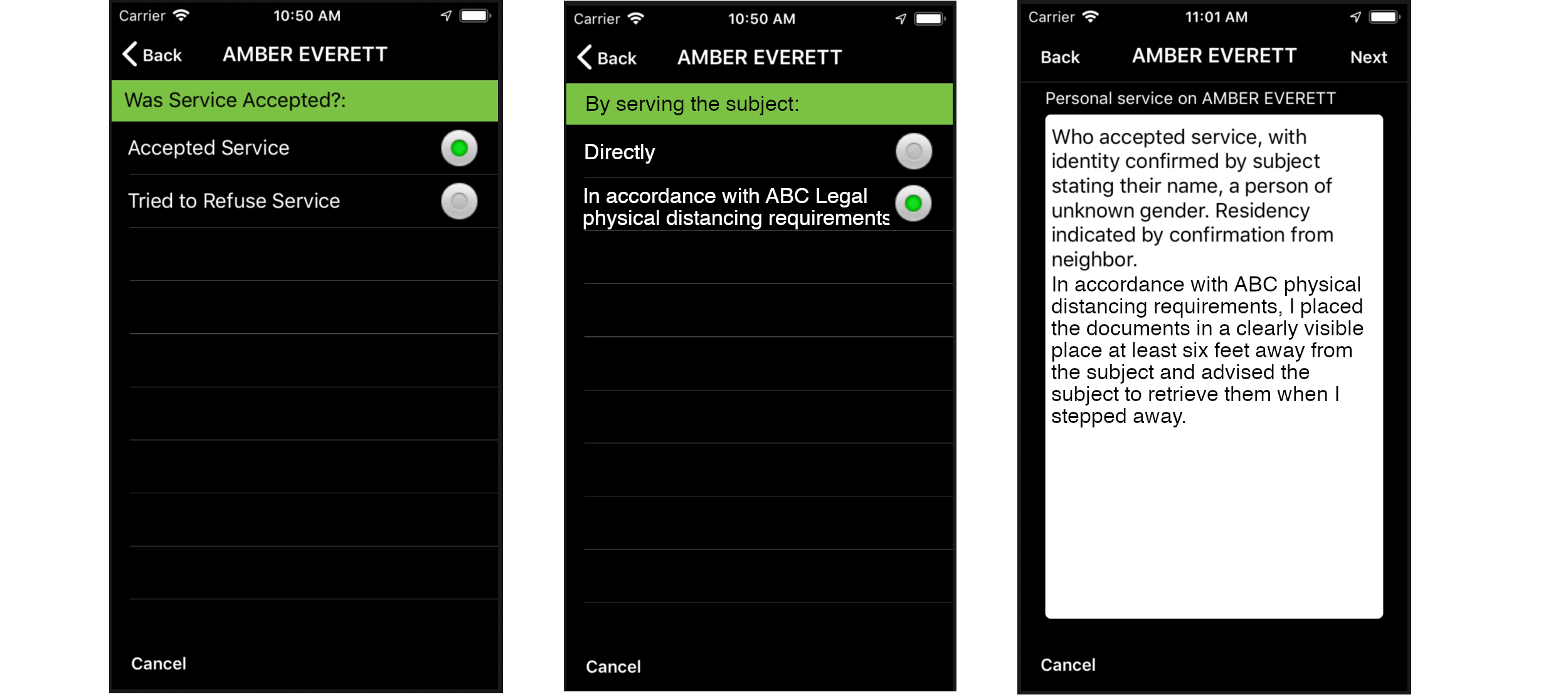In this article
What information does proof of service need?
What is a proof of service example?
What are common challenges for process servers?
Common proof of service mistakes and how to avoid them
What happens if a process server cannot serve?
How to file proof of service with the court
What is the deadline to file proof of service?
You probably have some grasp of what constitutes service of process. You know that legal documents have to be delivered to the party named in a lawsuit that’s been filed with the court. But what happens after a person has been served? What’s stopping a defendant from claiming they never received the documents? That’s where proof of service comes into play.
So what is proof of service, exactly?
Proof of service is a document that functions like a legal “receipt.” It confirms that documents have been delivered from one party to another in a legal matter; it’s a written declaration of a sworn statement attesting to the completion of service of process.It's sometimes referred to as a return of service or, when notarized, an affidavit of service. The document presented for court filing must include:
- An acknowledgment of service by the person served, or
- A certificate/declaration of service prepared by the person who performed service, which is often a process server

What information does proof of service need?
The court sets the rules for what information is needed in a proof of service. Details may vary depending on the type of case and the documents being delivered. The proof is generally filled out by the process server and typically includes:
- The name of the person who was served
- The date, place, and time where service was carried out
- How the person was served
- A description of the type of documents that were delivered
- The process server’s own name and signature
What is a proof of service example?
Here is an example of what proof of service looks like in practice. Keep in mind that the specific proof of service forms can differ depending on the jurisdiction, but this sample provides a clear idea of how it often appears.
Source: Judicial Council of California, Form POS-040
What are common challenges for process servers?
Sometimes, process servers face challenges locating defendants, particularly if someone has moved. These situations are difficult for the process server as well as the plaintiff in the case. If the legal documents don’t get delivered, the case cannot move forward.
What happens if a process server can’t deliver documents?
If a process server is unable to deliver the legal documents as outlined by the court, the server may still need to complete a signed declaration. This would need to be filed with the same court where the complaint was filed. The declaration states that the process server made a good faith effort to deliver the documents to the defendant. This document is formally called a declaration of non-service, also referred to as a proof of non-service, return of non-service or (when notarized) an affidavit of non-service.
When legal documents can't be delivered, the process server must submit a declaration of non-service to the court.
It’s important to remember, however, that process servers cannot simply make such a declaration and expect it to be taken at face value. The server must provide detailed information on all attempts to serve the documents. This information is necessary in case there is a challenge as to whether proper service of process was ever performed. It is well-established case lawthat an affidavit of non-service may be used to show that every effort was made to deliver legal documents to the defendant.
The proof of non-service can be used, in some cases, to support a motion for alternative service of process. Alternative service of process refers to special methods of service not typically allowed by the court unless in-person service cannot be performed.
Common proof of service mistakes and how to avoid them
Proof of service mistakes can be costly. Common issues include serving the wrong person or entity, delivering incorrect documentation, or missing deadlines, all of which can delay cases and affect judicial outcomes.
Incomplete service of process
To get proof of service, you must first have proper service of process.Service of process may be “incomplete” for a number of reasons, including:
- Serving the wrong person. Legal documents must be delivered to the named party—or someone legally authorized to receive them. Serving an unqualified individual can invalidate service.
- Incorrect method of delivery. There are specific rules for what delivery method must be used, such as personal service, substitute service, or service by alternative means, like mail. Handing documents to an unqualified co-resident of the defendant is an example of incorrect delivery.
- Service outside legal timeframes. Documents must be served within the court’s required window. Serving too early or too late can delay or jeopardize the case.
- Unqualified process server. Having a legally qualified person deliver legal documents is critical to proper service of process. Some states require process servers to meet specific age, residency, or licensing requirements. A party to the case or an underage individual usually does not qualify.
- Failure to follow special rules. Certain types of cases, which may include evictions, small claims, or cases involving government entities, have additional or more strict service of process rules. If the rules are not followed exactly, this may result in incomplete service.
Keep in mind that incomplete service undermines due process and can lead to serious delays or case dismissals. That's why having skilled process servers with regional knowledge and expertisecan make all the difference. They understand the importance of accurate delivery within specified timeframes and are aware of jurisdictional requirements for service of process.
Incomplete proof of service
Incomplete proof of service occurs when the documentation that needs to be filed with the court to confirm that service was completed is missing required information, inaccurate, or done improperly. This can jeopardize the case just as much as improper service. Here are the most common mistakes:
- Incomplete or inaccurate documentation - when the proof of service form is missing required details, is filed late, or contains incorrect information (e.g., wrong date, time, or location of service)
- Unsigned or undated forms - when the process server forgets to sign or date the proof of service, making it legally invalid
- Incorrect or vague information - when the form includes mistakes, such as inaccurate or incomplete descriptions, the wrong service address, incorrect party names, or fails to specify the relationship of the person served to the defendant (in cases of substitute service)
- Wrong form used - when the incorrect version of the proof of service form is submitted, or when required attachments are missing (especially in states with standardized judicial forms).
- Late filing - when the proof is not filed with the court within the required timeframe, even if service was completed properly.
- Failure to include required declarations - when required statements (such as declaration under penalty of perjury or notarization, depending on the jurisdiction) are not included, which can invalidate the filing
Incomplete proof of service can result in court rejection of the filing, a delay in proceedings, or even dismissal of the case. It’s essential that the process server completes the proof of service form thoroughly, truthfully, and in compliance with the court’s rules. Qualified process serverspay great attention to detail and recognize the importance of accuracy.
Failure to properly file proof of service with the court
A declaration of service must be filed with the court in order to confirm that service was properly completed. The responsibility of filing proof of service falls on the plaintiff or the plaintiff’s attorney, even though the process server was the person who filled out the proof of service.
It’s important to understand that even if everything else was done correctly, if the court filing is done incorrectly or not done at all, it could cause significant case delays and issues. Common court filing mistakes include:
- Missing filing deadlines - when there's failure to submit the proof of service form within the court’s required timeframe, which can lead to delays or penalties
- Filing with the wrong court or case - when the proof of service is submitted under the wrong case number or incorrect court jurisdiction
- Completing the proof improperly - when the proof of service form is submitted with errors (e.g., missing signatures, incorrect information), which may result in the court clerk rejecting it outright or requesting corrections
- Not filing proof of service at all - when the involved party mistakenly believes that serving the defendant is sufficient without filing the necessary form; the filed proof of service form demonstrates to the court that service of process occurred
Download the eBook: The Ultimate Guide to Ensuring Proper Service of Process
What happens if a process server cannot serve?
A process server should make every effort to render personal service—that is, to ensure that the documents are placed directly in the hands of the party being served. Doing this makes any challenges to service of process nearly impossible.
In some states, when personal service isn’t possible, the process server may be able to leave the documents with a person of appropriate age at the defendant’s place of residence, or, in limited cases, at the person’s workplace. This is known as substituted service. It’s important to note that the rules for proper substituted service vary by location. Some states set a minimum age for who may receive service on behalf of a defendant. Others do not allow it at all or require the court's permission.
But what happens if a process server cannot serve the documents personally?
Sometimes, personal or substituted service just isn’t possible. In these instances, service by publicationmight be an option. Service by publication involves publishing a complaint in a newspaper. Court approval is often required in order for any service by publication to be valid. Instead of a return of service affidavit serving as the proof, the process server would file an affidavit of publication as well as any other court-required documents related to service by publication.
Adhering to service of process rules is critical for maintaining the integrity of legal proceedings. Improper service can lead to case delays, dismissals, or judgments being overturned. At the very least, improper service can cause frustration for everyone involved. Other potential costs could be:
- Risk of dismissal - Cases may be dismissed—potentially permanently if the statute of limitations has expired—if service isn’t corrected in time.
- Wasted time and resources - Mistakes in service lead to duplicated efforts, increased legal fees, and lost time.
- Damage to credibility - Repeated errors can damage the plaintiff’s standing and reliability in the eyes of the court.
Using reputable process serverswho understand the critical role they play in legal proceedings and the importance of timely service can minimize delays to your case and help your firm avoid additional costs and penalties.
Download the eBook: The Ultimate Guide to Ensuring Proper Service of Process
How to file proof of service with the court
To properly file proof of servicewith the court, it has to be completed and signed by the person who served the documents. (Again, in many cases, this would be the process server.) However, filing proof of service with the court is usually handled by the plaintiff’s attorney or the plaintiff themselves. Here are the next steps for court filing:
- Make copies of the completed form for your records or to serve to other parties, if needed.
- File the original proof with the court handling the case, either in person at the clerk’s office or electronically if the court allows or requires e-filing.
- Confirm that the court has accepted the filing, and keep a stamped copy or electronic confirmation for your records.
So, when is proof of service complete?
Once the court has accepted the filing, proof of service is considered complete.
Here’s how to find your proof of service with ABC Legal.
A process server’s job isn’t done until the court has confirmed receipt of the filed proof of service.
What is the deadline to file proof of service?
Law firms take deadlines very seriously. After all, a late filing can torpedo a case. Filing proof of service often has strict time limits.
Failing to file the proof correctly and on time can seriously affect the plaintiff’s case. For example, in New York, cases involving landlord-tenant law require proof of service to be filed within three days of service of process. Other states and areas of law may have different deadlines.
Different types of lawsuits may also have unique deadlines for filing proof of service. Civil lawsuits in many states require filing within 60 days; family law cases often have a similar deadline of 30 to 60 days. Be sure to check local court rules and get into the habit of filing as soon as possible after service is complete.
It’s important to note that the countdown for a defendant to respond to a lawsuit in cases involving substituted service may not begin until the affidavit of service has been filed. That’s why it’s so critical for process servers to provide proof of service promptly. When law firms work with a reputable vendor like ABC Legal, they can be confident that the process server follows all applicable service of process rules and regulations properly.
Proof of service you can count on, thanks to ABC Legal
When dealing with strict regulations, tight deadlines, and proof that needs to hold up in court, you need process servers you can trust to get the job done right. Law firms that work with ABC Legal can count on getting some of the highest quality proofs of servicein the industry. ABC Legal uses technology to reinforce service of process, validating that proper service of process was carried out.
EvidenceChain™, powered by ABC Legal, ensures your proof is upheldwith GPS data, photos, and compliance checks, so you can easily and securely share the results. At ABC Legal, our established reputation and deep roster of highly vetted process servershelp law firms deliver legal documents across the country and around the world.
Want more ABC Legal expertise?
Find out how we can help grow your firm with fast, efficient, reliable service of process. Request a demotoday.
Updated on November 13, 2025.

Written by
Todd HarrisonService made simple—down the road and across the country. Join the 50,000+ professionals who trust ABC Legal for service of process.
Recent Posts
Subscribe to email updates
Popular posts
Learn More

Between the Lines: Service of Process Standards and Due Diligence

The Benefits of ABC Legal Services When Service is Contested








